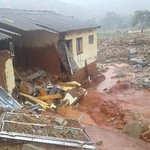In the wake of Ebola, SIM offers ground-breaking medical treatment
By John Stuart | Liberia in West Africa

In immense pain, James entered the Ebola survivor treatment unit in February 2015. Ebola had left his body months before, but he couldn't ignore the side effects any longer. His right eye was entirely clouded and the pain in his joints meant he could barely walk to the examination room.
His symptoms are common for Ebola survivors, who began coming back to the ELWA clinic in late 2014 with chronic ailments. Among them are vision issues, joint and muscle pains, abdominal discomfort and fatigue. The patients have survived, but their bodies are severely debilitated. Many have lost their jobs and families.
James' story of deep emotional turmoil after recovering from Ebola is familiar. His wife left him, afraid he was somehow contagious. Unable to work, James had no place to live and little food. He looked to ELWA Hospital in Monrovia, Liberia for help.
SIM missionary Dr. John Fankhauser, ELWA Hospital's Executive Director, has seen all stages of the Ebola epidemic. He was among a small group of medical personnel who first began treating Ebola patients in 2014. Along with SIM's Dr. Debbie Eisenhut, Dr. Kent Brantly, and Dr. Jerry Brown, he helped establish ELWA's ground-breaking protocols for Ebola treatment. He cared for SIM missionary Nancy Writebol and Dr. Brantly when they contracted the disease. Briefly evacuated during the epidemic, he risked his own life to return to ELWA Hospital to treat SIM doctor Rick Sacra, when he contracted Ebola in September 2014. Two years later, John and his colleagues are still committed to the Liberian people.
"Many of these survivors are dealing with emotional and spiritual impacts that are unique to this kind of disease," John said. "They're exposed to stigma in their communities, loss of livelihoods and things we don't see with other illnesses."
At the first consultation, John shakes the hand of every Ebola survivor and talks with them. He tells them he is thankful they survived. James, in a deep depression, was not impressed with this introduction.
"James asked me: 'What is there to be thankful for?'" John said. "He told me he lost his home, his wife, his family. I sat with him for almost an hour. I told him if he stays here with us and allows us to care for him for the next few months, he would see that we do care."
That is the humble place from which many patients begin their journey of recovery. The World Health Organization (WHO) has declared Liberia Ebola free. But for these survivors, the struggle continues.
The survivors' clinic is born
Ebola survivors first began returning to ELWA Hospital with new ailments in December 2014. When the influx was too much for their regular facilities, John launched Liberia's first Ebola survivor clinic with support from SIM and the Ministry of Health. One weekday at the clinic was allotted for Ebola survivors. When the patient load surpassed this limit they expanded to four days a week. SIM has funded a full-time doctor, Dr Romeo Orone from Kenya, to treat Ebola survivors at ELWA Hospital.
"We didn't want to further impact the stigma that some of the survivors had already been exposed to," John said. "So we put the clinic in our doctors' office and gave patients a 'survivor's insurance card.' They were discreetly seen in a private space."
John and fellow medical personnel were in uncharted waters. No clinic in the world had treated Ebola survivors on this scale. Recognizing the strategic need, SIM funded several teams of medical specialists to train local and international medical personnel at ELWA Hospital.
In 2015 a team of eye specialists from Emory University Hospital, USA, conducted training sessions, including Dr. Steven Yeh, who had treated Dr. Brantley and Nancy Writebol in 2014. Dr. Ian Crozier, an infectious disease specialist and Ebola survivor also joined the eye team. Dr. Duane Pearson, a rheumatologist from the University of Colorado, USA, came to treat patients with muscle and joint problems.
The Ministry of Health and Doctors Without Borders established three other Ebola survivor clinics throughout Monrovia in 2015. Numerous survivors are now receiving critical care across the capital.
SIM's contribution to the world of Ebola treatment has been significant. Working with Emory University Hospital, the Centers for Disease Control (CDC), and Liberia National Institutes of Health, John and others are gaining information that is critically important in treating Ebola survivors.
"Because we were some of the first to treat Ebola survivors, we were invited to be part of a network of doctors treating survivors in West Africa," John said. "Our team had the opportunity to contribute to the Liberian National Guidelines on Ebola Survivor Clinical Care and give input into the treatment guidelines published by WHO."
After years of civil war and social problems, the Ebola epidemic was just the latest in a series of crises to hit the Liberian people. Many have found hope in the epidemic's end and a new faith in God, but others are still grieving and waiting for healing.
Finding emotional healing
The story of Ebola survivors is one of physical turmoil and emotional trauma. To address this reality, ELWA Hospital patients are offered a free, six-week trauma healing session, led by trained personnel from the Evangelical Church of Liberia (ECOL) and SIM.
"We are here to partner with other believers in Liberia who sincerely love the people around them," John said. "One of the wonderful things we have to offer is Christian counseling and trauma healing. There are many who are looking to make sense of the horrific things they have endured, and our faith speaks to that."
Ebola survivor Nancy Writebol, who leads sessions emphasizing scripture and prayer as a means of healing, has an instant rapport with those she counsels.
"Our desire is that these sessions would help hurting and grieving people to connect with the scriptures and the healing power of the cross," Nancy said. "Our goal is to care for those who suffer severe wounds of the heart and spirit in the aftermath of Ebola, conflicts, disaster or abuse."
In 2015, ECOL and SIM counselors trained 80 trauma healing facilitators. They are holding more sessions for new facilitators and there are numerous trauma healing groups meeting across Monrovia. In May they trained their first trauma healing leaders to work specifically with children.
Today, James still receives treatment at ELWA Hospital. Arthritis medication has helped manage his joint pain and rebuild his mobility. Ebola permanently affected his body, but his outlook is dramatically brighter than the day he first arrived at the clinic.
In coordination with Samaritan's Purse, James was given a place to live and food to eat. Through regular counseling he has found healing and hope, and is communicating with his wife and family again. His turnaround has been dramatic. He even decided to become an official advocate for Ebola survivors and help others find the healing he did.
Nowadays, he also thanks God that he survived Ebola.
Pray for:
• James and other Ebola survivors to find continual peace in Christ.
• ELWA Hospital to shine as a light of the gospel in Liberia.
Related stories

Uruguay immigrants are putting down New Roots Duplicate 1
Uruguay has a large immigrant population, and students from the vocational programme at the Biblical Seminary of Uruguay, a partner of SIM, realised many foreigners were finding it difficult to adjust to their new home. New Roots ministry was formed to assist these newcomers!
Zimbabwe new stories 2 only en-gb fr
Short Summary
Zimbabwe new stories fr
short summary

